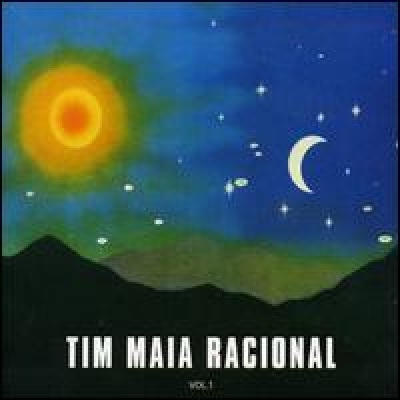
Racional vol. 1
Review by Matt Rinaldi The year was 1974. On the heels of the biggest hits of his career to that point, "Réu Confesso" and "Gostava Tanto de Você," Brazilian soul singer Tim Maia broke with his label, Polydor, lured by the offer of a double-album deal with RCA Victor. The 32-year-old Maia and his band retired to a house in a secluded section of Rio de Janeiro and spent their days smoking marijuana and experimenting with hallucinogens while working on new material. By the end of July, they had a few dozen songs worked out -- instrumental grooves that followed Tim's tried and true samba-soul formula -- but few lyrics. Pleased with the rough recordings, RCA dared to hope that their investment in the unpredictable singer would pay off in spades, but Tim managed to turn everything on its head. In the midst of a mescaline trip, he discovered a book entitled Universo em Desencanto (literally "Universe in Disenchantment"), the manifesto of an obscure religious cult known as Cultura Racional. Within weeks, Maia had dedicated his life to the cult, coerced his entire band to join and live by its strict precepts (no drugs, no alcohol, no red meat, and no sex except for the purpose of procreation), and was bent on a new direction for his double album. Gone was the accessible pop music he'd been known for, his usual romantic and party-oriented lyrics replaced by devotional verses. Tim Maia had conceived a new sort of lunatic gospel music rife with sci-fi imagery and relentless evangelism. "Read the book, the only book!" was Tim's mantra, repeated dutifully on every track. Clearly, he was obsessed, but whatever dubious logic and deception were behind it, the end result is astonishing. Drug-free (though perhaps not clear-headed) and abstinent from his usual dietary excesses, the singer was in top form, his already powerful voice infused with a passion and range heretofore unheard. Likewise, his meticulous tight-knit arrangements, which move seamlessly from lively pre-disco funk to thick, bluesy grooves, incorporating elements of reggae, psychedelic rock, and Motown-inspired soul, are stirring, regardless of the lyrics. Of course, all the new age rhetoric will fly right over the heads of non-Portuguese speakers, but one listen to the English-language "Rational Culture," which closes the first volume, will give an inkling to the madness at hand. An infectious 12-minute jam driven by Hammond organ and shimmering electric guitar digressions that would make Isaac Hayes proud, "Rational Culture" has Tim laying out the cult's core beliefs, declaring "We came from a superworld, a world of rational energy, and we live in an anti-world, a world of animal energy." Predictably, RCA Victor wanted nothing to do with Racional (Maia founded his own company, Seroma, and distributed the two albums independently in 1975), and neither did the public. Few record stores agreed to stock the albums; fans were put off by the strange covers (drawings that explains the cult's philosophy) and abstruse song titles. While one track, the brooding samba-reggae "Imunização Racional (Que Beleza)," received some airplay, the albums were universally panned by critics. Commercially, Racional represents the low point of Tim Maia's career. A year later, disenchanted with Cultura Racional, Tim broke with the cult once and for all, recalled both volumes from store shelves, and destroyed all the copies he could. Thus Racional became a shameful footnote, one that Maia strove to erase from the public's memory, and it remained so until years later, when other Brazilian artists such as Marisa Monte and Gal Costa starting covering "Imunização Racional (Que Beleza)." And while both volumes of Racional remained out of print throughout Tim Maia's lifetime, its legend grew. The few copies in circulation became coveted collector's items and, over the years, many have come to regard Racional as Maia's finest work. In 2006, Racional, Vol. 1 finally appeared for the first time in CD form on the Trama label.
